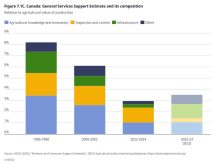Denmark’s agricultural and forestry sector must reduce greenhouse gas emissions by 55 per cent and 65 per cent by 2030 compared with 1990 levels, a majority in parliament agreed.
The new legally binding target is part of the government’s action plan towards reaching 70 per cent reductions by 2030, one of the most ambitious climate goals in the world.
Without any new initiatives, the sector’s greenhouse gas emissions by 2030 is estimated at roughly 15 million tonnes of carbon dioxide (CO2) equivalents, the government said.
“With a binding goal, we ensure that the agricultural sector delivers a historically high reduction and that we focus on plant protein, pyrolysis and organics,” said Minister for Food, Agriculture and Fisheries Rasmus Prehn.
Read Also

Manitoba Ag Days plans star-studded speaker lineup
Dragons’ Den panellist Arlene Dickinson among speaker series highlight for 2026 Manitoba Ag Days in Brandon, alongside slate of agriculture experts.
The agreement also includes a target to reduce nitrogen emissions by 10,800 tonnes in 2027.
It said roughly 3.8 billion Danish crowns (US$593 million) of state funds would be funnelled towards the sector’s green transformation as part of the agreement.
While the Danish Agriculture & Food Council, the industry’s lobby organization, said it was broadly satisfied with the agreement, environmental group Greenpeace was more skeptical, calling it “unambitious.”
“A binding reduction target for agriculture of as little as 55 per cent by 2030 is a parody which pushes responsibility on to other sectors,” said Kristine Clement, campaign lead at Greenpeace Denmark, in a statement.















